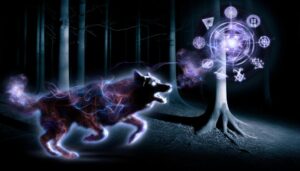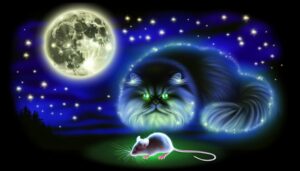Owl Spiritual Meaning Native American: Guidance and Insight
In Native American cultures, owls symbolize wisdom, mystery, and the transformation between the physical and spiritual worlds. Different tribes hold varying beliefs: the Hopi see owls as guardians of sacred knowledge; the Cherokee believe owls reveal hidden truths and guide the dead; the Apache view them as supernatural messengers linked to death.
Owls also act as protectors and spiritual guides, emphasizing the importance of intuition and internal wisdom. Their nocturnal nature underscores vigilance and insight in darkness.
Encountering an owl can signal impending changes or challenges. There’s rich cultural context that deepens the significance of these majestic creatures.
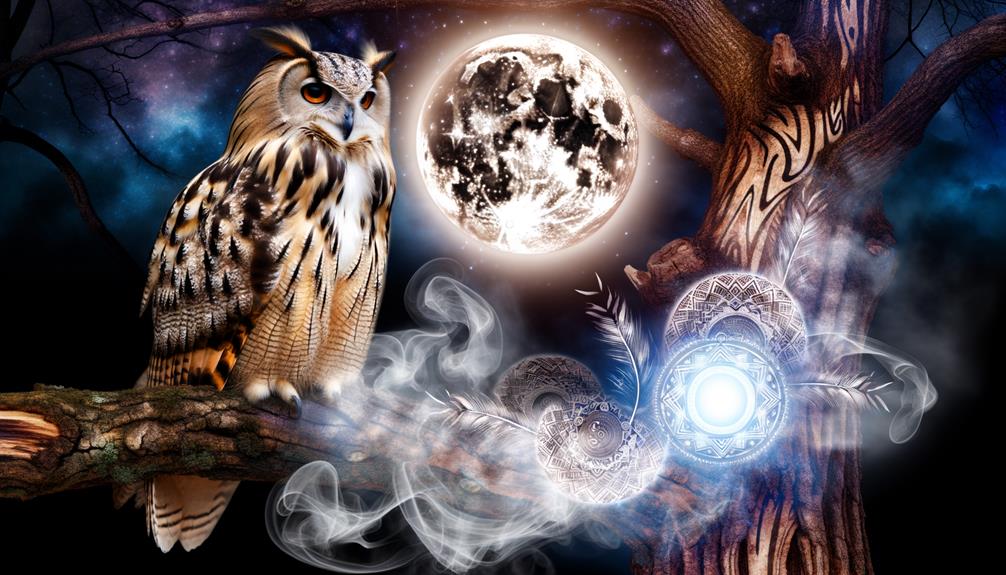
Exploring the Spiritual Significance of Owls in Native American Culture: Symbolism and Beliefs
| Tribe or Tradition | Spiritual Meaning | Symbolic Significance |
|---|---|---|
| Hopi | Owls represent a protective spirit and guide, especially in navigating the spirit world. | Viewed as connected to ancient wisdom and protection. |
| Cherokee | Owls are often associated with death, but not in a negative sense; they are seen as guides for souls transitioning to the afterlife. | Seen as spiritual messengers between the living and the dead. |
| Lakota Sioux | The owl symbolizes wisdom and protection. It can warn of approaching danger and provide insight into hidden truths. | Revered as a wise protector and a warning of unseen threats. |
| Zuni | The Burrowing Owl is considered a guardian of the underworld and a symbol of fertility and abundance. | Represents the connection between the earth and the underworld. |
| Navajo | Owls are considered ominous creatures and are linked to death or illness. Hearing an owl’s call might be viewed as a bad omen. | Seen as messengers of death or warnings of illness. |
| Apache | Owls are believed to carry the souls of the dead. They are feared and avoided because of their association with death and bad omens. | Symbolic of death and the unknown, often feared. |
Symbolism in Various Tribes
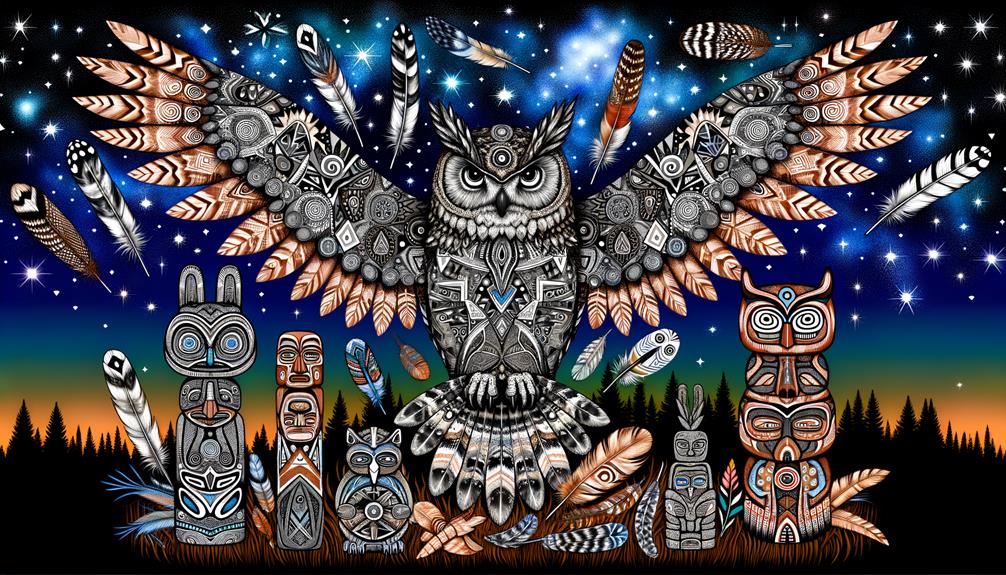
In various tribes, the owl’s symbolism often revolves around concepts of wisdom, mystery, and the change between life and death. In many indigenous traditions, the northern sawwhet owl symbolism is particularly rich, often representing a bridge between the spiritual and physical worlds. This diminutive owl, with its large, watchful eyes, is seen as a guide through life’s mysteries and a protector of sacred knowledge. Among some tribes, it is also believed to carry messages from ancestors, deepening its association with transformation and insight.
You’ll find that many Native American tribes perceive the owl as a wise entity, guiding individuals through challenging changes. For instance, the Hopi tribe sees the owl as a protector of sacred knowledge, while the Cherokee believe it can reveal hidden truths.
The owl’s nocturnal nature adds an element of enigma, bridging the tangible world and the spiritual dimension.
Additionally, some tribes view the owl as an omen or a guide for souls crossing into the afterlife.
Messenger of the Night
When you consider the owl as the ‘Messenger of the Night,’ you can see its symbolism in nighttime wisdom and its role as a guardian of sacred knowledge.
This nocturnal bird often represents the ability to see beyond the darkness, offering insights that are hidden from the day.
Symbolism in Nighttime Wisdom
Owls, often considered the messengers of the night, symbolize a profound connection to nighttime wisdom, embodying the mysteries and deeper truths that emerge under the cover of darkness.
When you see an owl, you’re witnessing a creature revered for its keen perception and ability to navigate the unseen. Native American cultures view owls as harbingers of insight, guiding individuals through life’s unknowns.
Their nocturnal nature signifies an attunement to intuition and the subconscious, domains often overlooked during daylight. Owls encourage you to explore hidden aspects of your psyche, urging you to trust your inner voice.
Guardian of Sacred Knowledge
Heralding ancient wisdom, the owl stands as a guardian of sacred knowledge, bridging the domains of the known and the mysterious.
In Native American cultures, the owl’s nocturnal nature symbolizes the keeper of esoteric truths and hidden insights. When you encounter an owl, it’s believed to be a messenger, delivering profound revelations from the spiritual sphere.
This bird’s keen vision in the dark represents the ability to see beyond deceit, uncovering truths that others might overlook. Owls also embody the connection between the living and the ancestral spirits, guiding you through dreams and intuition.
Their presence urges you to seek deeper understanding, emphasizing that true knowledge often lies beneath the surface, awaiting discovery in the quiet, shadowed moments of life.
Wisdom and Knowledge
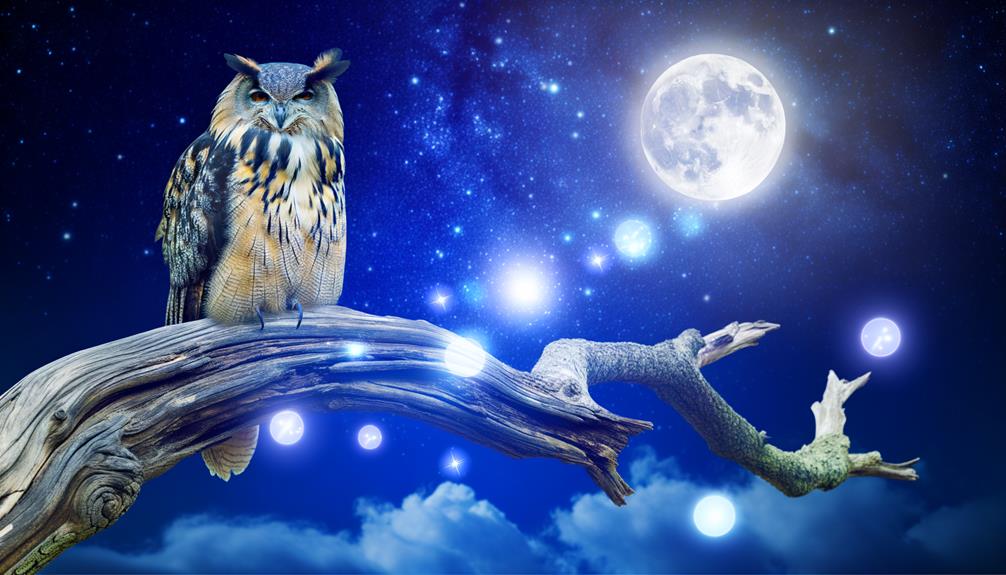
In many cultures, the owl epitomizes wisdom and knowledge, often symbolizing an enlightened grasp of the deeper truths of life.
Native American traditions hold the owl in high regard for its keen insight and perceptive abilities. You’ll find that the owl’s nocturnal nature conveys a connection to the mysteries and hidden aspects of existence.
Its ability to see in the dark is metaphorically linked to penetrating the veil of ignorance, offering clarity where there’s confusion.
By observing the owl, you gain a deeper appreciation for introspection and the pursuit of knowledge.
Its presence encourages you to trust your intuition and seek understanding beyond the surface, embodying the essence of true wisdom and intellectual depth.
Omens and Warnings
Many cultures perceive the owl as a harbinger of omens and warnings, often associating its appearance with impending change or significant events.
In Native American traditions, this belief is deeply rooted. If you encounter an owl, you might be receiving a signal about an upcoming shift in your life. The owl’s call, particularly at night, is thought to forewarn of challenges or alterations.
Different tribes interpret these signs uniquely; some see the owl as a messenger from the spirit world, cautioning you to be mindful. However, it’s crucial to contextualize these beliefs within each tribe’s specific cultural framework.
Understanding these interpretations can enhance your appreciation for the owl’s symbolic role in Native American spirituality.
Protector Spirits
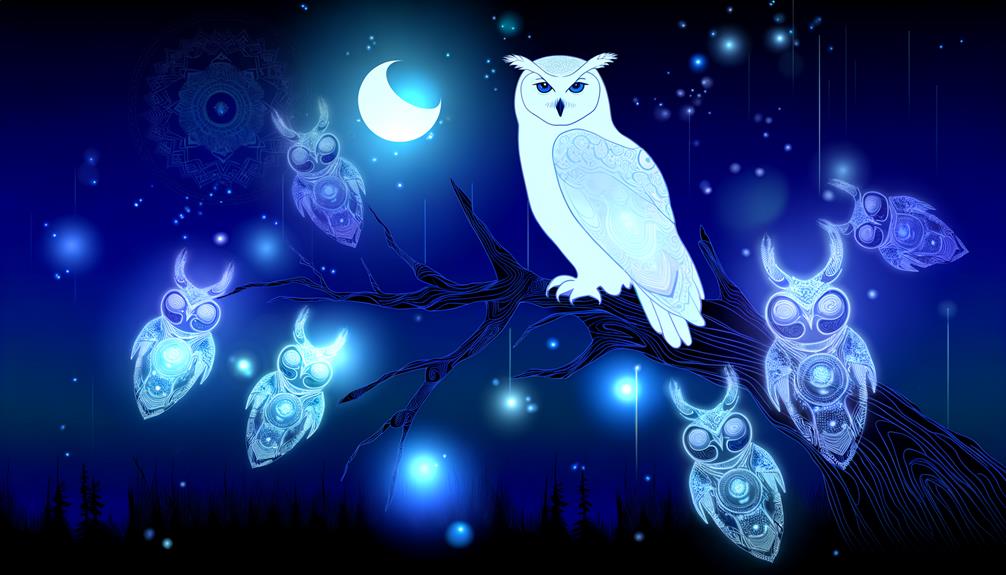
You’ll find that many cultures regard owls as guardian spirits symbolizing protection and wisdom.
Their ability to see in the dark has fostered beliefs in their nighttime vigilance, watching over and guiding souls through the unknown.
This symbolism extends to their role as protectors, ensuring safety and insight during times of uncertainty.
Guardian Animal Symbolism
Owls, often seen as guardian animals, symbolize protector spirits that watch over and guide individuals through life’s uncertainties. In Native American traditions, these majestic birds are revered for their wisdom and keen insight.
Their nocturnal nature suggests an ability to see what others can’t, making them ideal symbols of protection. You might find that owls are believed to provide spiritual guidance, helping you navigate through the unknown.
They serve as a reminder to trust your intuition and inner wisdom. The owl’s presence is often interpreted as a sign that you’re being watched over by a higher power, ensuring your safety and well-being.
This guardian symbolism underscores the importance of vigilance and understanding in your spiritual journey.
Nighttime Vigilance Beliefs
In various cultures, the owl’s role as a nighttime protector spirit underscores the belief that these creatures possess a heightened awareness and vigilance during the hours of darkness. Native American traditions often regard owls as guardians who watch over the nighttime environment.
This belief rests on several key elements:
- Enhanced Perception: Owls’ acute senses allow them to detect danger that humans might miss.
- Silent Flight: Their ability to fly silently enables them to observe without being detected.
- Symbol of Wisdom: They’re seen as wise beings capable of making sound judgments.
- Spiritual Messengers: Owls are often considered intermediaries between the physical and spiritual domains.
Understanding these elements helps you appreciate the deep reverence for owls as protector spirits in Native American culture.
Guides to the Spirit World
Owls are often seen as powerful guides to the spirit dimension, embodying wisdom and acting as intermediaries between the physical and metaphysical spheres.
In Native American cultures, you’ll find that owls symbolize deeper knowledge and the ability to see beyond the ordinary. Their nocturnal nature is believed to grant them access to the unseen, making them ideal messengers between domains.
When you encounter an owl, it’s a reminder to trust your intuition and seek inner truths. This bird’s presence often suggests that you’re being guided through a shift or significant change.
Mythological Stories
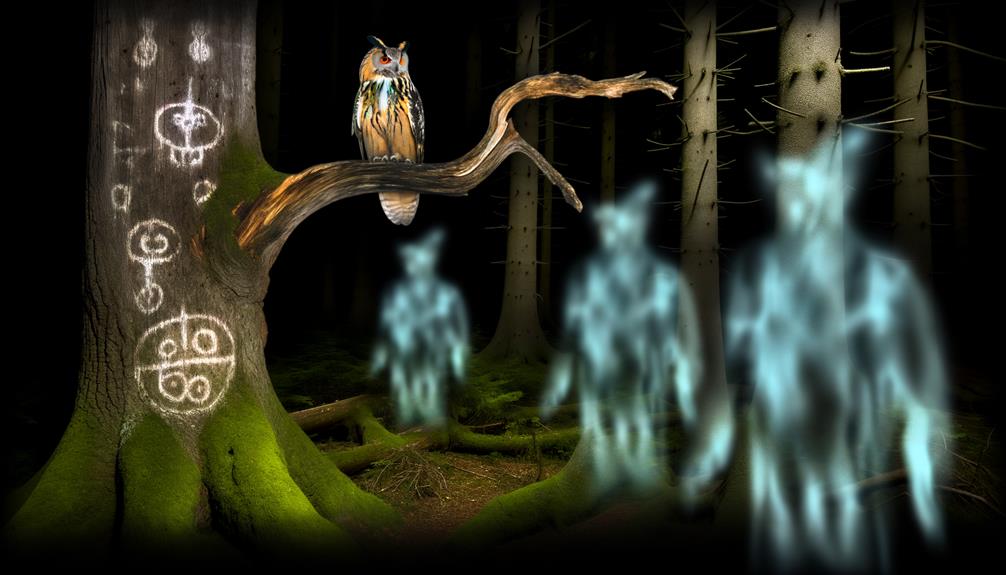
As we explore the spiritual dimensions of owls, their significance is also richly embedded in various mythological stories across cultures. Native American tribes often view the owl with a mixture of reverence and apprehension.
- Apache: Owls are considered messengers of the supernatural, often associated with death and warnings.
- Hopi: The burrowing owl, or Ko’ko, is seen as a guardian of the underworld and a protector of the dead.
- Cherokee: Owls are believed to carry the souls of the deceased and can offer guidance in the afterlife.
- Pawnee: Owls are seen as symbols of protection, often invoked during times of war.
These mythological stories underscore the multifaceted roles owls play in the spiritual and cultural practices of Native American tribes.
Rituals and Ceremonies
How do various cultures integrate the enigmatic presence of owls into their rituals and ceremonies, imbuing these birds with profound spiritual significance?
In many Native American traditions, owls symbolize wisdom and guidance from the spirit world. You’ll find that certain tribes use owl feathers in healing rituals, believing they channel protective energies.
Ceremonial dances, such as those of the Hopi tribe, often incorporate owl masks and imagery to invoke ancestral spirits. Some tribes, like the Apache, associate owls with death and use their presence in mourning ceremonies to honor the deceased.
Each ritual underscores the owl’s role as a powerful spiritual intermediary, bridging the gap between the earthly and the divine. This integration reflects deep cultural reverence for the owl’s mystical attributes.
Modern Interpretations
In contemporary society, the enigmatic owl continues to captivate the human imagination, often symbolizing wisdom, mystery, and the supernatural in various forms of media and personal belief systems.
You can observe its influential presence in multiple contexts:
- Literature and Film: Owls frequently appear as wise, mystical guides in stories and movies.
- Dream Interpretation: Dreaming of owls is often associated with introspection and uncovering hidden truths.
- Spiritual Practices: Modern spiritualists see owls as totems representing insight and intuition.
- Cultural Symbols: Various cultures use the owl in art and folklore to convey deeper meanings.
Understanding these modern interpretations provides a nuanced view, bridging traditional Native American beliefs with contemporary perspectives.
Conclusion
In conclusion, think of the owl as a wise elder whispering secrets of the universe.
In many Native American tribes, the owl serves as a guardian, a beacon of wisdom, and a harbinger of both caution and insight.
Just as a nocturnal owl sees through the darkness, you’re encouraged to look beyond the surface and seek deeper truths.
Embrace the owl’s guidance as you navigate life’s mysterious journey, much like tribal stories that illuminate paths through the unknown.

